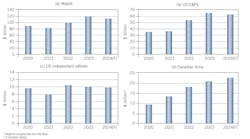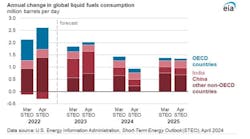Energy prices tumbled lower June 1 on fears of declining demand at the end of the first week of the summer driving season with markets focused on the deteriorating European debt crisis.
Like some Hollywood monster in a horror movie, “the European debt crisis just won't die and in fact is getting even worse,” said analysts in the Houston office of Raymond James & Associates Inc. “The flight to safety trade intensified to new levels as investors stampeded into US, British, and German bonds, driving the interest rate on the 10-year Treasury to a record low of 1.47%.”
Meantime, they said, “Spain is inching closer to a bailout, leading to the question on everyone's minds: can the Euro-zone survive?”
On the other hand, Raymond James analysts reported, “Against the backdrop of flat-to-down oil production in most of Latin America, Brazil's oil boom remains robust with Petrobras leading the way. Having grown its domestic oil production by an average of 3.4%/year between 2002 and 2011—despite a markedly slower performance over the past few years—Petrobras has laid out a highly ambitious target of 11% annualized growth in 2011-15, with sustained expansion thereafter through 2020. Alongside support from the Western majors and oil service providers, Petrobras’s aggressive capital spending program and project development pipeline imply that Brazil is likely to surpass Mexico as the No. 1 oil producer in Latin America by mid-decade.”
Such robust growth is not without risks, of course, including project delays, presalt development risk, capital markets risk, and political risk. “For all these reasons,” Raymond James analysts said, “we wouldn't be surprised to see Petrobras’s production targets being toned down somewhat in the coming years—and our Petrobras model ‘discounts’ the 2015 guidance by 17%—but it’s still safe to say that Brazil is set to be one of the few major oil producers [including both the Organization of Petroleum Exporting Countries or non-OPEC] with material production growth over the next 5-10 years.”
Energy prices
The July contract for benchmark US light, sweet crudes bounced between $82.27-86.59/bbl in intraday trading June 1 on the New York Mercantile Exchange before closing at $83.23/bbl, down $3.30 for the day. The August contract dropped $3.29 to $83.56/bbl. On the US spot market, West Texas Intermediate at Cushing, Okla., was down $3.30 to $83.23/bbl.
The new front-month July contract for heating oil lost 7.53¢ to $2.63/gal on NYMEX. Reformulated stock for oxygenate blending for the same month decreased 6.59¢ to $2.66/gal.
The July natural gas contract fell 9.6¢ to $2.33/MMbtu on NYMEX. On the US spot market, gas at Henry Hub, La., dropped 9.5¢ to $2.24/MMbtu.
In London, the July IPE contract for North Sea Brent was down $3.44 to $98.43/bbl. Gas oil for June tumbled $23 to $847.75/tonne.
The average price for OPEC’s basket of 12 benchmark crudes declined $2.62 to $97.44/bbl. So far this year, OPEC’s basket price has averaged $115.43/bbl.
Contact Sam Fletcher at [email protected].

